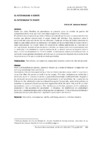Identificador persistente para citar o vincular este elemento:
https://accedacris.ulpgc.es/jspui/handle/10553/75704
| Campo DC | Valor | idioma |
|---|---|---|
| dc.contributor.author | Santana Ramos, Emilia M. | en_US |
| dc.date.accessioned | 2020-11-18T15:31:25Z | - |
| dc.date.available | 2020-11-18T15:31:25Z | - |
| dc.date.issued | 2016 | en_US |
| dc.identifier.issn | 2317-7721 | en_US |
| dc.identifier.other | WoS | - |
| dc.identifier.uri | https://accedacris.ulpgc.es/handle/10553/75704 | - |
| dc.description.abstract | From a philosophical perspective, paternalis misseen as a model of behavior management that aims at guaranteeing human well-being.Paternalism is the position expressed by a State in ordertomake decisionson behalf of a person on issues that affect this person withouth is active consent. This state interference on anindividual's autonomy occurs in twoways: it can be purpose-built (Government it self establishes the goals of an individual's existence) and process-built (Government it self establishes the procedureto be followed by the individual in order to a chieve those goals). Occasionally, paternalistic policies are presented as purpose-built and process-built approaches all at the same time, and this is when paternalismis shown in full intensity. This interference on the free autonomy of the individual is projected on the grounding for paternalism. In thissense, the interference on anindividual's autonomy is implemented gradually, while giving due consideration (if that is the case) tothelevel of proficiency shown by the individuals subjectedto a paternalistic interference. | en_US |
| dc.description.abstract | Desde una visión filosófica, el paternalismo se presenta como un modelo de gestión del comportamiento humano que tiene como objetivo garantizar el bienestar. El paternalismo es la posición que toma el Estado para decidir por el sujeto sin contar con él en los asuntos que afectan estrictamente al propio interés del individuo. Esta injerencia sobre la autonomía del sujeto admite dos formas diferentes. Puede ser de fines (el Estado determina los objetivos que deben presidir su existencia) y de medios (el Estado determina el procedimiento a seguir para alcanzar sus propias metas). En ocasiones las políticas paternalistas se presentan a la vez bajo la forma de paternalismo de medios y de fines, asumiendo entonces el paternalismo toda su intensidad. Esta interferencia sobre la autonomía de la libertad personal se proyecta sobre la base justificativa del paternalismo. En este sentido, la interferencia sobre la autonomía personal se realiza de manera gradual, atendiendo, en todo caso, la consideración del grado de capacitación de las personas sobre las que se actúa de un modo paternalista. | en_US |
| dc.language | spa | en_US |
| dc.relation.ispartof | Revista De Direito Da Cidade-City Law | en_US |
| dc.source | Revista De Direito Da Cidade-City Law[ISSN 2317-7721],v. 8 (3), p. 886-907, (2016) | en_US |
| dc.subject | 560203 Filosofía del derecho | en_US |
| dc.subject | 560508 Derecho privado | en_US |
| dc.subject.other | Paternalism | en_US |
| dc.subject.other | Incompetence | en_US |
| dc.subject.other | Inability | en_US |
| dc.subject.other | Well-Being | en_US |
| dc.subject.other | Autonomy | en_US |
| dc.subject.other | Individual Freedom | en_US |
| dc.subject.other | Paternalismo | en_US |
| dc.subject.other | Incompetencia | en_US |
| dc.subject.other | Incapacidad | en_US |
| dc.subject.other | Bienestar | en_US |
| dc.subject.other | Autonomía | en_US |
| dc.subject.other | Libertad personal | en_US |
| dc.title | El Paternalismo a debate | en_US |
| dc.title.alternative | El Paternalism to debate | en_US |
| dc.type | info:eu-repo/semantics/Article | en_US |
| dc.type | Article | en_US |
| dc.identifier.doi | 10.12957/rdc.2016.22338 | en_US |
| dc.identifier.isi | 000392285700004 | - |
| dc.description.lastpage | 907 | en_US |
| dc.identifier.issue | 3 | - |
| dc.description.firstpage | 886 | en_US |
| dc.relation.volume | 8 | en_US |
| dc.investigacion | Ciencias Sociales y Jurídicas | en_US |
| dc.type2 | Artículo | en_US |
| dc.contributor.daisngid | 6217897 | - |
| dc.description.numberofpages | 22 | en_US |
| dc.utils.revision | Sí | en_US |
| dc.contributor.wosstandard | WOS:Ramos, EMS | - |
| dc.date.coverdate | 2016 | en_US |
| dc.identifier.ulpgc | Sí | en_US |
| dc.contributor.buulpgc | BU-DER | en_US |
| dc.description.esci | ESCI | |
| item.grantfulltext | open | - |
| item.fulltext | Con texto completo | - |
| crisitem.author.dept | GIR La decisión Judicial. Cuestiones migratorias. Derechos Humanos, nuevas tecnologías y Derecho. | - |
| crisitem.author.dept | Departamento de Ciencias Jurídicas Básicas | - |
| crisitem.author.orcid | 0000-0002-7390-4065 | - |
| crisitem.author.parentorg | Departamento de Ciencias Jurídicas Básicas | - |
| crisitem.author.fullName | Santana Ramos, Emilia María | - |
| Colección: | Artículos | |
Visitas
134
actualizado el 10-ene-2026
Descargas
254
actualizado el 10-ene-2026
Google ScholarTM
Verifica
Altmetric
Comparte
Exporta metadatos
Los elementos en ULPGC accedaCRIS están protegidos por derechos de autor con todos los derechos reservados, a menos que se indique lo contrario.
